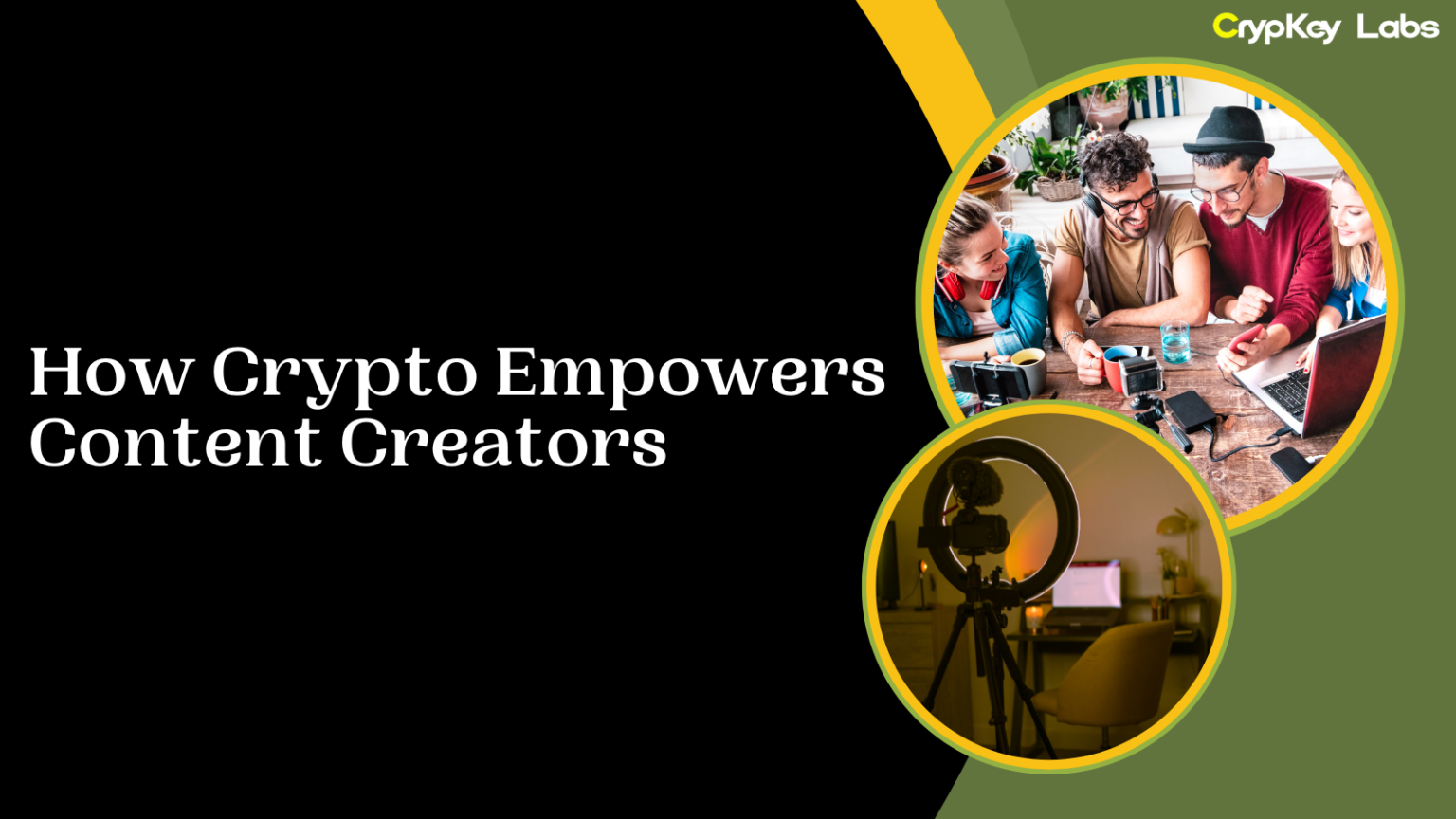The digital world has opened up immense opportunities for content creators, allowing them to reach global audiences with ease. However, traditional methods of monetizing content often leave creators facing multiple challenges, such as inconsistent income, platform restrictions, and high fees from intermediaries. Enter cryptocurrency — a revolutionary tool that is transforming how creators are paid and how they control their work. In this blog, we’ll explore how crypto empowers content creators, offering them more control, financial freedom, and global accessibility.
The Traditional Challenges for Content Creators
Before diving into how crypto changes the game, it’s essential to understand the traditional challenges content creators face:
Monetization Issues
For most creators, earning a living depends on ads, sponsorships, or donations through centralized platforms like YouTube or Patreon. These revenue models can be unstable, especially if a creator’s content doesn’t align with advertisers’ preferences. Moreover, platforms take a cut from the earnings, leaving creators with a smaller portion of what they’ve earned.
Platform Dependency
Content creators rely on large platforms like Instagram, YouTube, or TikTok to reach their audience. These platforms have the power to control who sees a creator’s content, sometimes limiting visibility due to ever-changing algorithms. If a platform decides to change its rules or ban an account, a creator’s livelihood can be jeopardized.
Censorship and Content Control
Many creators face content restrictions based on platform policies. These platforms may censor or demonetize content that doesn’t comply with their guidelines, limiting creative freedom. This creates an environment where creators must constantly adjust their work to avoid penalties.
High Fees
When creators earn money through traditional systems, they often have to deal with high transaction fees. Payment processors, banks, and platforms take a cut from each transaction, reducing the overall income creators receive from their hard work.
How Cryptocurrency Empowers Content Creators
Cryptocurrency offers a solution to these challenges, providing creators with more control over their income and work. Here are several ways crypto empowers content creators:
Direct Monetization
One of the most significant benefits of cryptocurrency is the ability to receive payments directly from fans and supporters. Instead of relying on third-party platforms that take a cut of their earnings, creators can use crypto to accept payments instantly. This eliminates the need for intermediaries, meaning creators keep a larger portion of their revenue. For example, a writer can use Ethereum to sell eBooks directly to their audience, bypassing publishers and payment processors.
Decentralized Platforms
Blockchain-based platforms, such as Audius for musicians and BitClout for social media creators, give content creators more control over their work. These decentralized platforms are powered by blockchain, meaning creators aren’t dependent on a single company’s policies or algorithms. They can publish content, engage with fans, and earn crypto directly. This decentralization also offers creators more freedom from censorship, as there is no central authority to regulate content based on subjective policies.
Smart Contracts for Royalties
Smart contracts, powered by blockchain, are automated agreements that execute when specific conditions are met. For content creators, this means they can automatically receive royalties every time their work is shared, sold, or licensed. For instance, a photographer who sells a digital image as an NFT (non-fungible token) can program a smart contract to ensure they receive a percentage of every resale, even if the image is sold multiple times in the future.
Micropayments and Donations
Cryptocurrency enables the possibility of micropayments, which allow fans to support creators with even small amounts of money. Unlike traditional payment systems that often have minimum transaction limits or high fees, crypto transactions can be as small as a fraction of a cent. This allows creators to receive micro-donations from fans, which can add up over time and provide a new income stream.
NFTs (Non-Fungible Tokens) and Ownership of Digital Content
One of the most exciting developments in the creator economy is the rise of NFTs, which allow creators to tokenize their work and sell it directly to fans.
What Are NFTs?
NFTs are unique digital assets that represent ownership of specific content, whether it’s a piece of art, a song, a video, or even a tweet. They are stored on a blockchain, making it easy to verify ownership and authenticity.
Ownership and Royalties
For creators, NFTs provide a new way to monetize their work. By minting their content as NFTs, creators can sell unique digital items to fans. NFTs also ensure creators earn royalties whenever their work is resold, thanks to smart contracts. This gives artists, musicians, and other creators a new level of control over how their work is distributed and monetized.
New Revenue Streams
NFTs open up new opportunities for creators to generate income. For example, musicians can sell limited-edition tracks as NFTs, or visual artists can sell exclusive digital art pieces. These NFTs can become collectibles, increasing in value over time and creating a new financial opportunity for creators.
Enhanced Creative Freedom
Censorship Resistance
With decentralized platforms powered by blockchain, content creators no longer have to worry about arbitrary censorship from centralized authorities. On these platforms, creators have the freedom to publish their content without fear of being demonetized or restricted due to platform guidelines.
Content Ownership
When creators use blockchain-based platforms, they maintain full ownership of their work. This is especially important for digital artists, writers, and musicians who want to ensure their content isn’t exploited or used without their permission. With blockchain, ownership is recorded and tracked, ensuring creators are properly credited and compensated.
Global Accessibility
Borderless Payments
One of the most empowering aspects of cryptocurrency is its global nature. Creators can receive payments from fans anywhere in the world without worrying about currency exchange rates or international banking restrictions. This opens up a global audience for creators, allowing them to connect with supporters across borders.
Eliminating Banking Barriers
For creators in underbanked regions, cryptocurrency offers a way to receive payments without needing access to traditional banking systems. This is especially valuable for creators in countries with limited banking infrastructure, as crypto enables them to earn and spend money in a borderless, decentralized way.
Real-Life Examples of Creators Using Crypto
Artists
Many digital artists have embraced NFTs, selling their work directly to collectors. For example, artists like Beeple have made headlines by selling their digital artwork as NFTs, earning millions in the process.
Musicians
Musicians are using platforms like Audius to connect with fans and distribute their music without intermediaries. These platforms allow artists to earn crypto directly from listeners, bypassing traditional record labels.
Writers
Writers are also exploring crypto platforms like Mirror, which allows them to publish and sell their writing in a decentralized way. These platforms empower writers to retain control over their work while earning cryptocurrency.
Challenges and Limitations of Using Crypto
While crypto offers many benefits for content creators, it also comes with its challenges:
Volatility
Cryptocurrency prices can fluctuate significantly, which means creators might see the value of their earnings change rapidly. This volatility can make it difficult to plan for consistent income.
Learning Curve
Many content creators and their audiences are unfamiliar with how cryptocurrency works. It takes time and effort to learn how to use crypto wallets, understand transaction fees, and navigate decentralized platforms.
Adoption Barriers
While crypto is gaining popularity, it’s still not mainstream. Some fans may be hesitant to support creators using crypto due to security concerns or a lack of understanding.
The Future of Crypto for Content Creators
As cryptocurrency becomes more widespread, it’s likely that more content creators will adopt it as part of their revenue strategy. With ongoing innovations like smart contracts and NFTs, crypto offers creators new ways to earn, share, and control their content. In the future, we may see even more user-friendly crypto platforms that make it easier for creators and their audiences to interact.
Conclusion
Cryptocurrency empowers content creators by providing them with new tools to monetize their work, gain independence from centralized platforms, and connect with global audiences. While there are challenges to using crypto, the benefits of direct payments, creative freedom, and ownership of digital content are compelling reasons for creators to explore this technology. As the world of crypto continues to evolve, content creators are poised to benefit from its transformative power.







